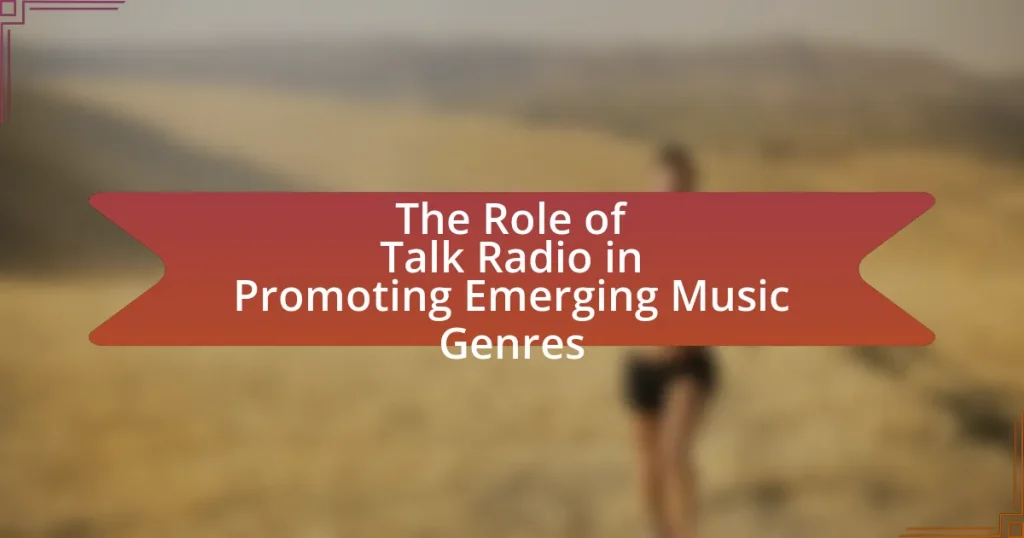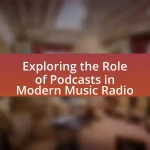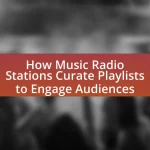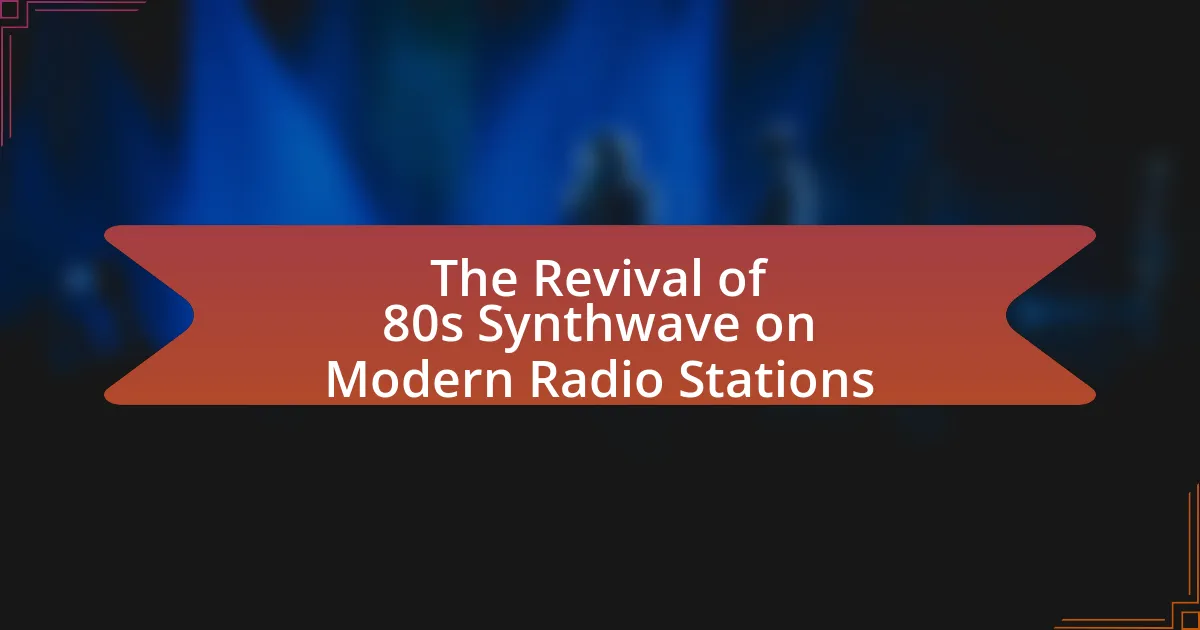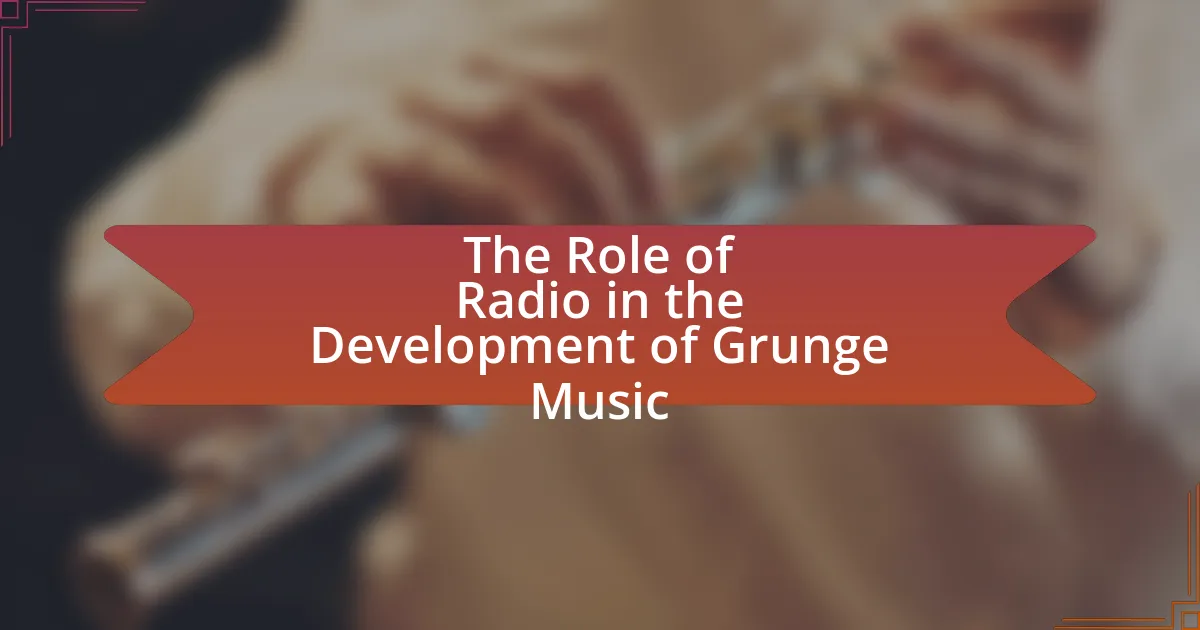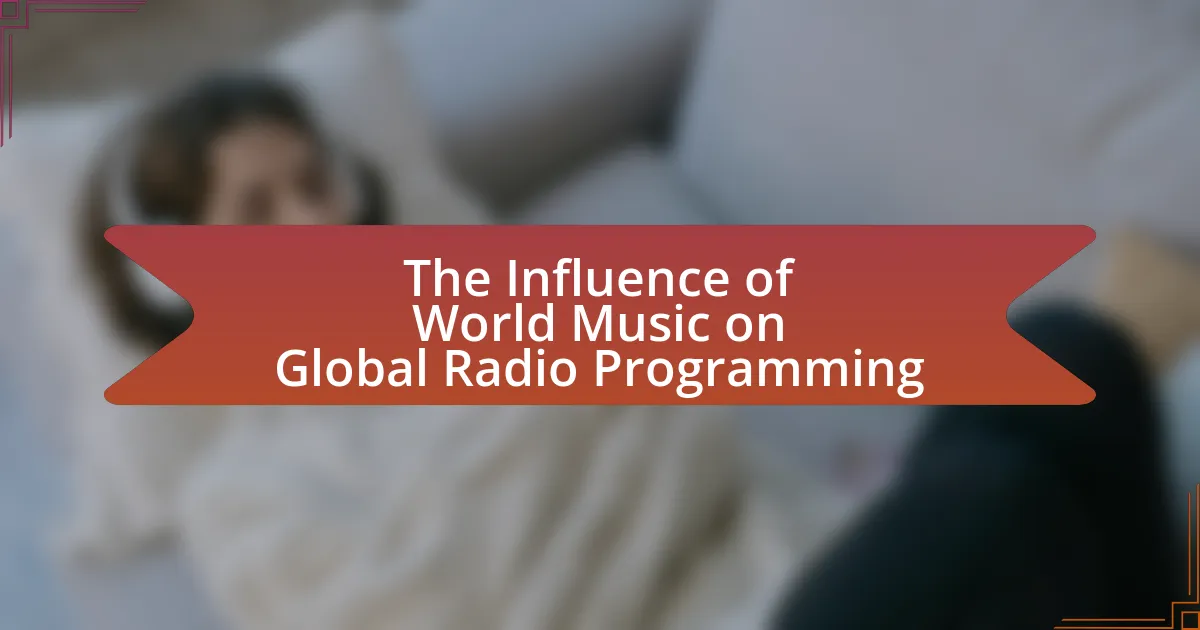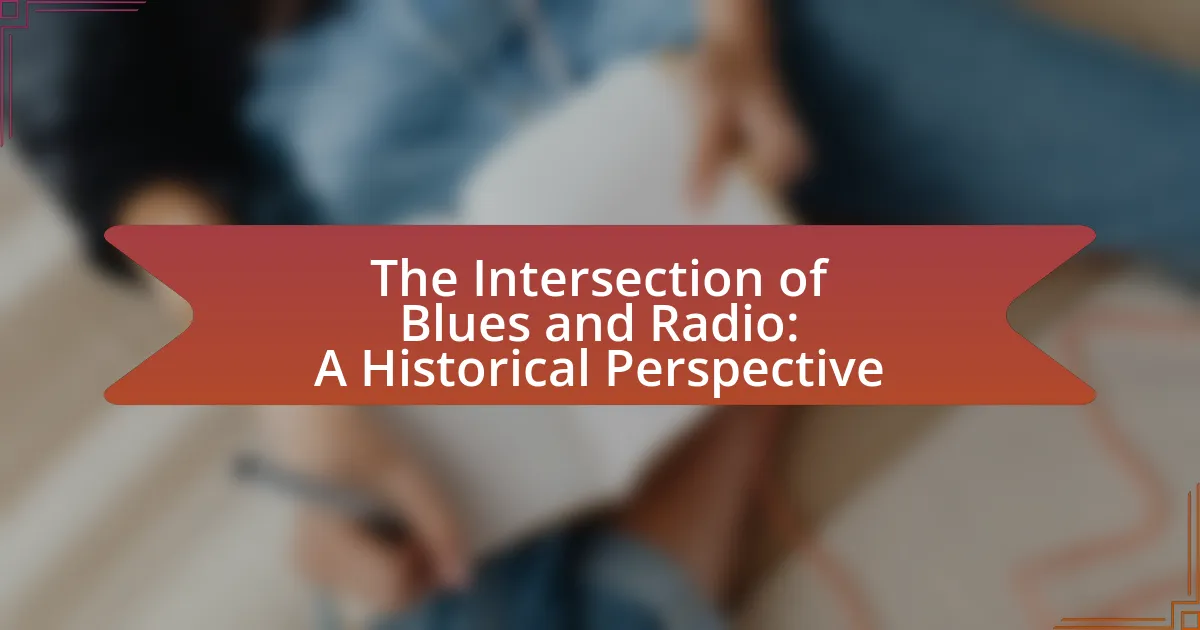Talk radio serves as a crucial platform for promoting emerging music genres by facilitating discussions, artist interviews, and live performances that introduce new sounds to listeners. It influences music discovery and audience engagement, particularly for niche genres that may lack mainstream exposure. Through targeted programming and collaborations with artists, talk radio enhances visibility and fosters community interaction, ultimately impacting streaming numbers and concert attendance for emerging musicians. However, challenges such as limited airtime and listener preferences for familiar music can hinder the promotion of new genres. The article explores the mechanisms of talk radio in shaping music trends, its relationship with the music industry, and strategies for better supporting emerging artists.
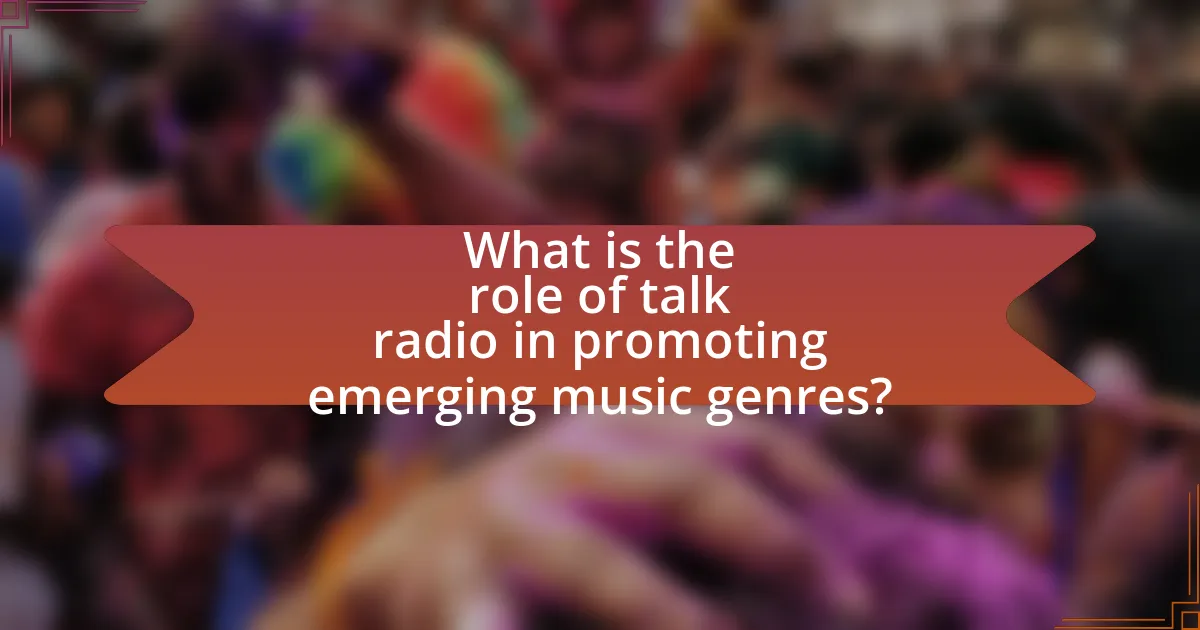
What is the role of talk radio in promoting emerging music genres?
Talk radio plays a significant role in promoting emerging music genres by providing a platform for discussion, exposure, and audience engagement. Through interviews with artists, live performances, and genre-specific segments, talk radio introduces new sounds and trends to listeners who may not encounter them through traditional music channels. For instance, programs that focus on niche genres like indie rock or electronic music can help cultivate a dedicated fan base, as evidenced by the rise of artists who gained popularity after being featured on talk radio shows. This exposure can lead to increased streaming numbers and concert attendance, demonstrating the tangible impact of talk radio on the success of emerging music genres.
How does talk radio influence the discovery of new music?
Talk radio influences the discovery of new music by providing a platform for artists and genres that may not receive mainstream attention. Through interviews, discussions, and music showcases, talk radio hosts introduce listeners to emerging musicians and diverse musical styles. For instance, programs like NPR’s “All Songs Considered” highlight independent artists, significantly impacting their visibility and listener engagement. This exposure can lead to increased streaming and sales, as evidenced by studies showing that radio airplay correlates with higher music chart rankings.
What mechanisms do talk radio stations use to introduce new genres?
Talk radio stations introduce new genres primarily through targeted programming, audience engagement, and collaborations with artists. Targeted programming involves dedicating specific segments or shows to showcase emerging genres, allowing listeners to discover new music. Audience engagement is facilitated through listener requests, polls, and social media interactions, which help gauge interest and promote new genres based on listener feedback. Collaborations with artists, such as interviews and live performances, provide a platform for musicians to present their work directly to the audience, further enhancing exposure. These mechanisms have been effective in promoting genres like hip-hop and electronic music, which gained traction through talk radio’s innovative approaches.
How do DJs and hosts contribute to the promotion of emerging music?
DJs and hosts play a crucial role in promoting emerging music by curating playlists that feature new and lesser-known artists, thereby increasing their exposure to a wider audience. By selecting tracks from these artists for airplay, DJs introduce listeners to fresh sounds and genres that may not be available through mainstream channels. For instance, radio stations that focus on specific genres, such as indie or electronic, often rely on DJs to highlight up-and-coming talent, which can lead to increased streaming and sales for those artists. Additionally, hosts often conduct interviews and provide platforms for these musicians to share their stories, further engaging the audience and fostering a connection between the artist and listeners. This practice not only supports the artists but also enriches the listening experience by diversifying the music landscape.
Why is talk radio significant for emerging artists?
Talk radio is significant for emerging artists because it provides a platform for exposure and audience engagement. Through interviews, discussions, and music showcases, talk radio allows artists to reach diverse listeners who may not be familiar with their work. For instance, programs that feature new music segments can introduce emerging artists to a broader audience, facilitating discovery and potential fan base growth. Additionally, talk radio often fosters community interaction, enabling listeners to connect with artists directly, which can enhance loyalty and support. This direct engagement is crucial for artists seeking to establish their presence in a competitive industry.
What opportunities does talk radio provide for new musicians?
Talk radio provides new musicians with opportunities for exposure, networking, and audience engagement. By featuring interviews, live performances, and discussions about emerging music genres, talk radio stations can introduce new artists to a broader audience. For instance, programs that focus on local music scenes often highlight up-and-coming musicians, allowing them to reach potential fans who may not be familiar with their work. Additionally, talk radio can facilitate connections between musicians and industry professionals, such as producers and promoters, enhancing their chances of securing gigs and collaborations. This platform not only amplifies their music but also fosters community support, which is crucial for new artists trying to establish themselves in a competitive industry.
How does talk radio help in building an artist’s fan base?
Talk radio helps in building an artist’s fan base by providing a platform for exposure and engagement with listeners. Through interviews, discussions, and music features, talk radio allows artists to connect directly with potential fans, share their stories, and promote their music. For instance, a study by the Pew Research Center found that 32% of adults in the U.S. listen to talk radio, indicating a significant audience that artists can reach. Additionally, when talk radio hosts endorse or feature an artist, it can lead to increased visibility and credibility, further attracting listeners to the artist’s work.
What challenges do emerging music genres face in talk radio?
Emerging music genres face significant challenges in talk radio, primarily due to limited airtime and audience familiarity. Talk radio typically prioritizes established genres that attract larger audiences, making it difficult for new genres to gain exposure. Additionally, the format of talk radio often emphasizes discussion over music, which can further marginalize emerging genres that rely on musical discovery. According to a 2021 study by the Pew Research Center, 70% of radio listeners prefer familiar music, indicating a resistance to exploring new sounds. This preference creates a barrier for emerging genres seeking to establish a foothold in the talk radio landscape.
How do listener preferences impact the promotion of new genres?
Listener preferences significantly influence the promotion of new music genres by determining which styles receive airtime and visibility. When listeners express a strong affinity for specific genres, radio stations and promoters are more likely to feature those genres to attract and retain audiences. For instance, research indicates that when a genre gains popularity among listeners, it often leads to increased airplay, as seen with the rise of hip-hop in the 1990s, which was propelled by listener demand and subsequently dominated radio playlists. This dynamic creates a feedback loop where listener preferences shape programming decisions, ultimately impacting the commercial success and mainstream acceptance of emerging genres.
What barriers exist for talk radio in featuring emerging music?
Talk radio faces several barriers in featuring emerging music, primarily due to its focus on talk content over music programming. This format prioritizes discussions, interviews, and news, which limits airtime for music. Additionally, regulatory constraints and licensing issues can complicate the inclusion of new artists, as stations must navigate copyright laws and potentially costly licensing fees. Furthermore, audience expectations often lean towards established music, making it risky for talk radio to invest in promoting lesser-known artists. According to a study by the Pew Research Center, 62% of talk radio listeners prefer familiar content, which discourages stations from featuring emerging music.
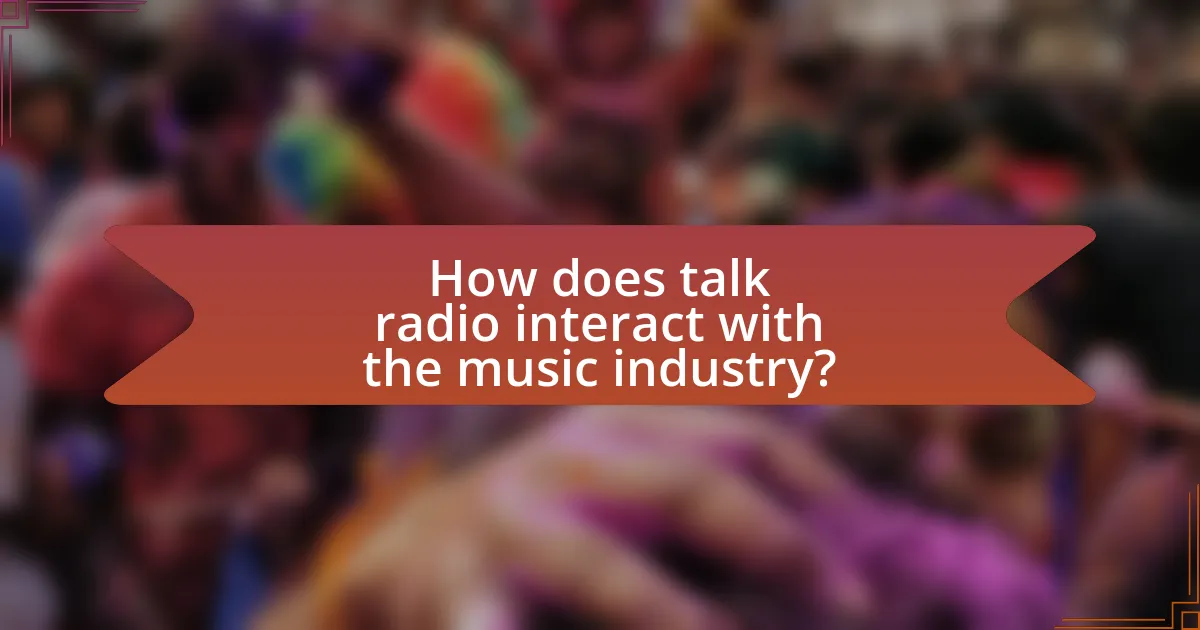
How does talk radio interact with the music industry?
Talk radio interacts with the music industry primarily by providing a platform for discussion and promotion of emerging music genres. This interaction occurs through interviews with artists, music reviews, and discussions about trends, which can significantly influence public perception and interest in new music styles. For instance, programs that feature local musicians or niche genres can help to elevate these artists’ profiles, leading to increased airplay and sales. Additionally, talk radio often engages listeners through call-ins and social media, creating a community around specific music genres, which can drive grassroots support and awareness. This dynamic relationship has been evident in the rise of genres like hip-hop and indie rock, where talk radio has played a crucial role in introducing these styles to broader audiences.
What partnerships exist between talk radio and record labels?
Partnerships between talk radio and record labels primarily involve promotional collaborations where talk radio stations feature new music, interviews with artists, and discussions about upcoming releases. These partnerships enable record labels to leverage talk radio’s audience to promote emerging artists and genres, enhancing visibility and engagement. For instance, record labels often provide exclusive content or early access to new tracks for talk radio shows, which can lead to increased airplay and audience interest. Additionally, talk radio hosts may participate in promotional events or campaigns organized by record labels, further solidifying the relationship and driving listener engagement with new music.
How do record labels leverage talk radio for marketing?
Record labels leverage talk radio for marketing by utilizing the platform to promote new artists and music genres through interviews, live performances, and discussions. This strategy allows labels to reach a targeted audience that is engaged in music-related content, thereby increasing visibility and listener engagement. For instance, talk radio shows often feature segments dedicated to emerging artists, providing them with a platform to showcase their work and connect with potential fans. Additionally, according to a study by the Pew Research Center, 41% of adults in the U.S. listen to talk radio, indicating a significant audience that labels can tap into for effective marketing campaigns.
What role do promotions and sponsorships play in this relationship?
Promotions and sponsorships are crucial in the relationship between talk radio and emerging music genres as they provide financial support and visibility for new artists. Talk radio stations often collaborate with sponsors to create promotional segments that highlight emerging music, thereby increasing audience exposure and engagement. For instance, a study by the Pew Research Center indicates that 54% of listeners discover new music through radio promotions, demonstrating the effectiveness of this medium in introducing new genres. Additionally, sponsorships can lead to exclusive interviews and live performances, further solidifying the connection between talk radio and the promotion of emerging music.
How does talk radio shape music trends and listener tastes?
Talk radio shapes music trends and listener tastes by providing a platform for discussion and promotion of emerging genres. Through interviews, commentary, and curated playlists, talk radio hosts influence audience perceptions and preferences, often introducing listeners to new artists and styles. For instance, programs that feature genre-specific discussions can lead to increased interest and consumption of those genres, as evidenced by the rise of alternative rock in the 1990s, which was significantly boosted by talk radio segments dedicated to the genre. Additionally, listener engagement through call-ins and social media allows talk radio to gauge audience reactions, further refining the music that is promoted and shaping overall trends in listener tastes.
What influence does talk radio have on genre popularity?
Talk radio significantly influences genre popularity by providing a platform for discussion and promotion of various music styles. This medium allows hosts to introduce listeners to emerging genres, often leading to increased awareness and interest. For instance, talk radio shows that feature interviews with artists or discussions about new music trends can drive listener engagement and encourage exploration of those genres. Research indicates that when talk radio stations highlight specific genres, there is a measurable increase in streaming and sales for those genres, demonstrating the direct impact of talk radio on music consumption patterns.
How do talk radio playlists reflect current music trends?
Talk radio playlists reflect current music trends by curating songs that resonate with contemporary cultural and social issues. These playlists often include tracks that align with popular movements, such as social justice or environmental awareness, showcasing artists who address these themes in their music. For instance, during the rise of the Black Lives Matter movement, talk radio stations prominently featured hip-hop and R&B artists whose lyrics focused on racial inequality, thereby amplifying relevant voices and trends. This alignment not only keeps the playlists fresh and engaging but also serves to connect listeners with the prevailing sentiments of society, demonstrating the influence of talk radio in shaping and reflecting musical landscapes.
What impact does talk radio have on music consumption habits?
Talk radio significantly influences music consumption habits by introducing listeners to new genres and artists through discussions and interviews. This exposure often leads to increased interest and exploration of the featured music, as talk radio hosts frequently highlight emerging trends and provide context around the music. For instance, a study by the Pew Research Center found that 36% of talk radio listeners reported discovering new music through the medium, demonstrating its role in shaping listener preferences and expanding their musical horizons.
How does talk radio affect streaming and sales of new music?
Talk radio significantly influences streaming and sales of new music by providing a platform for artists and songs to gain exposure. When talk radio hosts discuss or feature new music, it often leads to increased listener interest, which can translate into higher streaming numbers and sales. For instance, a study by Nielsen Music found that songs mentioned on talk radio shows experienced a 20% increase in streaming activity within a week of the mention. This demonstrates that talk radio can effectively drive audience engagement with new music, ultimately impacting its commercial success.
What demographic shifts are observed in listeners of talk radio?
Listeners of talk radio have experienced significant demographic shifts, particularly in age and political affiliation. Research indicates that the audience has been aging, with a notable increase in listeners aged 50 and above, while younger demographics, particularly those under 35, have shown a decline in engagement. Additionally, there has been a shift towards a more politically polarized audience, with conservative talk radio attracting a predominantly right-leaning listener base, while liberal talk shows have gained traction among progressive audiences. This trend is supported by data from the Pew Research Center, which highlights that in 2020, 63% of talk radio listeners identified as conservative, compared to 29% who identified as liberal.
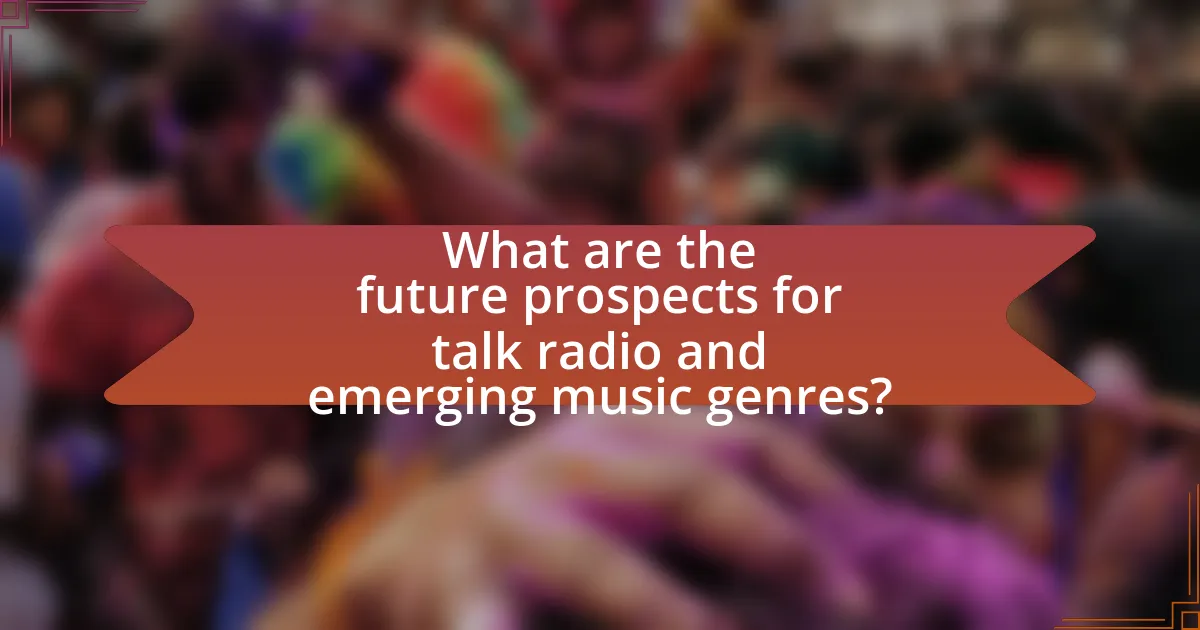
What are the future prospects for talk radio and emerging music genres?
The future prospects for talk radio and emerging music genres are promising, as talk radio continues to adapt to digital platforms and audience preferences. Talk radio has seen a resurgence in popularity, with a 2021 Nielsen report indicating that 82% of Americans aged 18 and older listen to AM/FM radio weekly, which includes talk formats. This adaptability allows talk radio to serve as a vital platform for promoting emerging music genres, as hosts can introduce new artists and styles to engaged audiences. Additionally, the rise of podcasting and streaming services has created opportunities for talk radio to reach niche markets, further supporting the discovery and promotion of diverse music genres.
How is technology changing the landscape of talk radio?
Technology is transforming the landscape of talk radio by enabling greater accessibility and interactivity for audiences. Digital platforms allow listeners to access talk radio content on-demand, breaking geographical barriers and expanding the potential audience base. According to a 2021 report by Edison Research, 75% of Americans aged 12 and older have listened to online radio, indicating a significant shift from traditional broadcasting. Additionally, social media integration allows for real-time audience engagement, enabling listeners to participate in discussions and influence content. This evolution not only enhances listener experience but also provides talk radio hosts with immediate feedback and a broader reach, ultimately reshaping the format and delivery of talk radio programming.
What role do podcasts play in the evolution of talk radio?
Podcasts have significantly transformed the evolution of talk radio by providing a platform for on-demand audio content that caters to diverse interests and niche audiences. Unlike traditional talk radio, which is often limited by time slots and geographic reach, podcasts allow creators to produce content that can be accessed anytime and anywhere, thus expanding the audience base. According to Edison Research, as of 2021, 41% of Americans aged 12 and older have listened to a podcast in the past month, indicating a growing trend that reflects the shift in how audiences consume audio content. This shift has encouraged traditional talk radio stations to adapt by incorporating podcasting elements, such as longer-form discussions and specialized programming, to retain listeners and attract new ones.
How are social media platforms influencing talk radio’s reach?
Social media platforms are significantly expanding talk radio’s reach by enabling real-time audience engagement and content sharing. This interaction allows listeners to participate in discussions, share episodes, and promote shows across their networks, effectively increasing visibility. For instance, a study by Edison Research in 2021 found that 54% of podcast listeners discovered new shows through social media, illustrating how these platforms serve as vital promotional tools for talk radio. Additionally, social media analytics provide talk radio hosts with insights into audience preferences, allowing for tailored content that resonates more with listeners, further enhancing reach and engagement.
What strategies can talk radio adopt to better support emerging genres?
Talk radio can adopt strategies such as featuring dedicated segments for emerging genres, collaborating with independent artists, and utilizing social media to engage listeners. By allocating specific time slots to showcase new music styles, talk radio can create awareness and interest among audiences. Collaborating with independent artists allows for authentic promotion and direct connections to niche audiences. Additionally, leveraging social media platforms can enhance listener interaction and provide a space for feedback, further supporting the growth of these genres. These strategies are effective as they directly engage listeners and foster a community around emerging music.
How can talk radio enhance its engagement with new artists?
Talk radio can enhance its engagement with new artists by featuring them in interviews, live performances, and discussions about their music. This direct exposure allows listeners to connect with emerging talent and fosters a community around new genres. For instance, programs that dedicate segments to spotlighting new artists can increase their visibility and listener engagement, as evidenced by shows that have successfully launched careers through consistent artist features. Additionally, talk radio can leverage social media platforms to promote these artists, creating a multi-channel approach that amplifies their reach and encourages audience interaction.
What best practices should talk radio follow to promote diversity in music?
Talk radio should implement a diverse playlist strategy to promote a wide range of music genres. This involves actively including artists from various cultural backgrounds and genres in programming, ensuring representation of underrepresented voices in the music industry. Research indicates that diverse playlists can enhance listener engagement and broaden audience demographics, as seen in studies by the Pew Research Center, which found that 72% of listeners appreciate stations that feature a variety of music styles. Additionally, talk radio can host interviews and discussions with diverse artists, providing them a platform to share their stories and music, thereby fostering a more inclusive musical landscape.
What practical tips can emerging artists use to leverage talk radio?
Emerging artists can leverage talk radio by actively engaging with hosts and participating in interviews to showcase their music and story. This direct interaction allows artists to reach a targeted audience that is already interested in music discussions. Additionally, artists should consider submitting their tracks for airplay and requesting features on relevant talk shows, as many programs seek fresh content to attract listeners. According to a study by the Pew Research Center, 41% of adults in the U.S. listen to talk radio, indicating a significant potential audience for emerging artists. By utilizing social media to promote their appearances and encouraging fans to tune in, artists can maximize their exposure and build a loyal following.
